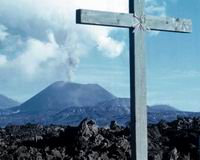
One of the best selling books many years ago was When Bad Things Happen to Good People. The title suggests much of the problem. A person is divorced when he/she did not want to be. Cancer strikes indiscriminately. Freak circumstances occur bringing grief and heartache to a whole family. You name it and you can think of someone who has experienced it. A more current
book Where is God when it hurts? faces the same boundless
questions.
Why didn't God do this or that? Philosophers of the past have boxed in the concept of God so that if He is all good, and all powerful, he must do something about controlling evil events. Since these events happen, it must be that he is not all good, or all powerful or both. This kind of reasoning came from a pagan view of God. It seems to be the only thing they knew about God. The God of the Bible is different. He is loving,caring, patient, merciful, and able to accomplish his will and purpose. The God of the Bible is the
Creator
who has given humans the wonderful gift of freedom of choice. Man
can, in fact he must, make choices. One writer has commented that 95%
of
the evils in the world are the result of one human doing evil to
another or many. Humans war on others, exploit,
rape, torture, and bring about countless evils of
society. If I come down with cancer it is not an act of God that brought it. It is part of the system of the world in which one organism exploits another organism. There are good bacteria in my system and bad bacteria. The bad do not belong there and my body may be able to fight them off. If not, the invader, or cells out of harmony, will win and I lose. There is freedom in the world not only in the human realm. Diseases are a form of invasion of my life by something that does not belong there. Murder is the invasion of my life by someone who does not belong there. There are people who want to blame God for everything. However, the God of the Bible has expressed Himself in a loving act of joining Himself to humanity, living among us, teaching us what He is like, dying to establish a New Covenant of forgiveness, promising the gift of Himself in our lives as well as giving the gift of everlasting life in his presence. This is certainly not the god of the pagan philosophers. Does God know when these things happen to us? Surely. Jesus said that the hairs of our head are numbered and a sparrow does not fall to the ground without His knowing it. This does not keep us from growing bald, and sparrows still die. Jesus experienced grief, death, hunger, thirst, betrayal, humiliation, torture, the loss of loved ones, and the temptations that are common to humans. "...the cross demolished for all time the basic assumption that life will be fair." (Yancey, p.184) Moreover, Jesus did not promise his followers a carefree life. In fact, he said that we would suffer for his name's sake. For instance, in the year 1998 alone, over 300,000 people around the world had their lives taken from them because they simply bore the name of Christian. What Jesus did promise was his presence in all kinds of circumstances. He told his disciples "...I will be with you always, to the end of the age." (Mt. 28:20) In the midst of life's complicated sorrow on whatever level it is, we have these great words of hope: "Who, then can separate us from the love of Christ?"..."For I am certain that nothing can separate us from his love, neither death nor life, neither angels nor other heavenly rulers or powers, neither the present not the future, neither the world above nor the world below--there is nothing in all creation that will ever be able to separate us from the love of God which is ours though Jesus Christ our Lord." (Rom 8:28,35,38-39 TEV) Among early Christians there was one, Irenaeus, who spoke about "soul building." The struggles and problems of life do one of two things to us: l) we mature to be persons who endure, who grow, who sympathize, who become persons of depth and character, or 2) we become people who blame everyone else for what happens to us, we become sour, cynical, and bitter and in so doing become isolated and isolating. How we respond is up to us, but the consequences are enormous for our outlook on life and how to deal with it. Many of the "great souls" of Christian history suffered much in their lives but we do not remember this. We remember them for their greatness of mind, greatness of dedication, and the accomplishments coming from their lives. The
question
we must face is: what will I do? Will I look to the
future
to develop my own character and personhood, or will I allow the
past
events to shrivel up my soul and character? Check out How To Get to Heaven from wherever you are... The Healing Site |